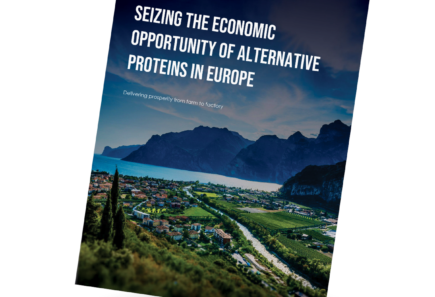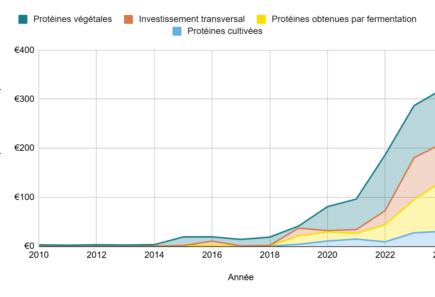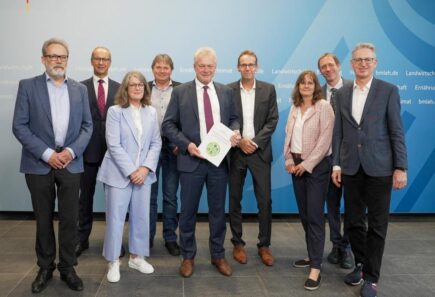Public research funding
The Good Food Institute Europe’s policy and science and technology teams work to boost public research and development funding to make alternative proteins delicious and affordable for everyone.

Why should governments fund alternative protein research?

Just like they have funded research and development into renewable energy to make it the default option, governments committed to climate and biodiversity targets should fund open-access research into plant-based foods, cultivated meat and fermentation. By funding diversified protein sources, governments can also ensure that innovative food science reaches commercialisation, enabling Europe to be a leading player in food biotechnology and biomanufacturing.
Companies are already developing these foods, and some governments are leading the way in investing, but it will take much higher levels of government investment to accelerate progress, bring prices down and make these options available everywhere.
Public sector investment in open-access research can address foundational issues and support the growth of a whole sector, rather than just one company.
What level of funding is needed?
The Global Innovation Needs Assessment (GINA) conducted by ClimateWorks Foundation and the Foreign, Commonwealth and Development Office (FCDO) suggested we needed a global investment of US$10.1 billion every year in research & development and infrastructure & scaling to unlock the benefits of alternative proteins.
To meet that target by 2050, we estimate that European governments should be collectively investing €1.3 billion a year by 2035, with €550 million of that dedicated to R&D.

If all European countries contributed equally to meeting this target, based on their proportional annual R&D spend, this pie chart gives an overview of what the picture would look like.
Government investment in R&D funding sends strong signals to companies and to private investors and therefore acts as a catalyst. Additionally, the role of public funding is complementary to private investment. While companies tend to be focused on near-term challenges and usually want to protect their innovations, public funds can be invested in longer-term, forward-looking R&D questions that are designed to maximise public benefits. Public funding can address foundational issues and as results tend to be open-access, it can support the growth of a whole sector, rather than just one company.
Defining public-sector R&D funding
Public-sector R&D funding can be defined as funding that leads directly to the advancement of scientific, technical, and socio-economic knowledge and capacity. This could be funding for academic research projects, research training programmes such as PhDs or fellowships, consortia or partnerships between academia and companies which may include private funding contributions, and grants to companies to fund innovation. There are many other types of public investment that are needed for food systems transition, such as loans to companies to fund scaling up, and investments in building/ retrofitting infrastructure. These kinds of investments are important to bring down costs and make sustainable options available for a broad array of people.
“Given that taste, price and convenience decide what most people eat, publicly funded research should focus on making plant-based and cultivated meat competitive on these fronts – so that sustainable options become the default choice.”
acacia smith, Senior gfi europe policy manager
How are governments supporting alternative protein research?

European Union
The EU has funded €48 million during the first half of Horizon Europe, with a number of multi-year consortia-based projects, including filling knowledge gaps across all alternative protein types, creating enabling food environments, assessing the benefits of cultivated meat, and advancing fermentation.
GFI supports a number of these projects, such as Smart Protein, HealthFerm, and GIANT LEAPS. Read more about our involvement in project consortia.
Belgium
The Flemish Government has granted €3.5 million to a project developing cultivated foie gras to support business and employment opportunities in the region.
Denmark
In 2021, Denmark committed nearly 675 million kroner (€91 million) to support the country’s growing plant-based sector and incentivise farmers to grow protein-rich crops, establishing itself as a global leader in funding plant-based foods.
Finland
Finland awarded a €34 million grant to fermentation startup Solar Foods, enabling the company to accelerate the progress of their first production facility and doubling the nation’s investment in sustainable proteins. This follows various other government funding grants and loans which together total close to an additional €30 million.
France
In 2022, France announced €55 million for research on plant-based protein production and functionality. They have also supported plant-based manufacturer Umiami with a grant of €7.4 million.
Germany
In 2023, Germany started to take a lead in funding for alternative proteins. Through a Federal Ministry of Food and Agriculture call, they are investing up to 18.1 million euros in alternative proteins, including cultivated seafood, between 2023 and 2027. In November 2023, the Budget Committee of the German Bundestag decided to invest more than 30 million euros in the sustainable protein transition. The measures adopted include a stronger focus of the German protein crop strategy on human nutrition, the expansion of the funding of plant-based foods and cultivated meat, transformation aid for farmers and the establishment of a Centre Proteins of the Future.
Netherlands
As the pioneer of cultivated meat, the Netherlands launched the record-breaking €60 million Cellulaire Agricultuur Nederland funding programme, designed to accelerate research and the commercialisation of cultivated meat and precision fermentation, as well as education and training to ensure workers are ready to take on the jobs this sector creates.
Spain
The Spanish government has invested €5.2 million in a project to develop cultivated meat made with healthier fats, in an effort to reduce rates of colon cancer and high cholesterol, two of Spain’s most fatal health problems. In 2023, the regional government of Catalonia in Spain invested €7 million in a Center for Innovation in Alternative Proteins (CiPA), which will help alternative protein businesses in plant-based and fermentation-derived foods scale up production.
United Kingdom
In 2023, the results of a £15.6 million funding call led by UK Research and Innovation topped a record year for investments in alternative proteins. The UK is home to a rich alternative protein R&D ecosystem, including a new cellular agriculture manufacturing research hub led by the University of Bath and backed by £12 million of government funding.
We also see fantastic examples from governments in countries such as Canada, Israel and Singapore committing serious sums and investing in the potential of plant-based and cultivated meat as well as fermentation. See GFI’s State of Global Policy report (available in English, French, Italian and Spanish) for a full overview of European and global R&D funding.
Where is public research funding needed?
GFI Europe has conducted market research to build a roadmap to success for plant-based and cultivated meat. Check out sustainable protein innovation priorities to learn more about commercial whitespaces, research gaps, technological needs, and investment priorities at each stage of the value chain.

How we work
GFI Europe works with scientists, policymakers and other organisations to reduce knowledge gaps about the important role of public R&I in the plant-based, cultivated, and fermentation sectors.
- Our policy and science teams work with policymakers and research funders to share our expertise on R&I priorities, helping to ensure that government investment is directed towards the highest-impact areas. We define impact based on which R&I will lead to the greatest level of uptake and therefore societal benefit.
- We utilise our strong networks with the European research field to support scientists in accessing funding.
- We fund research through our global Research Grants Programme, with more than €19m allocated so far to researchers in 19 different countries. We also fund research in collaboration with other funders, for example our 2022 cultivated meat co-funding with EIT Food.
- We collaborate with EU level platforms working in food systems R&D, including EIT Food, FOODForce, the Climate Innovation Hub, and the European Alliance for Plant-based Foods.
See more on how R&I paves the way to sector growth:

Boston Consulting Group. (2022).

Climate Advisers. (2023).

Climate Works Foundation. (2023)

Our public research funding expert
Acacia Smith leads our work to secure public funding for sustainable protein research and development, working with scientists, policymakers and other organisations to accelerate plant-based and cultivated meat innovation.








